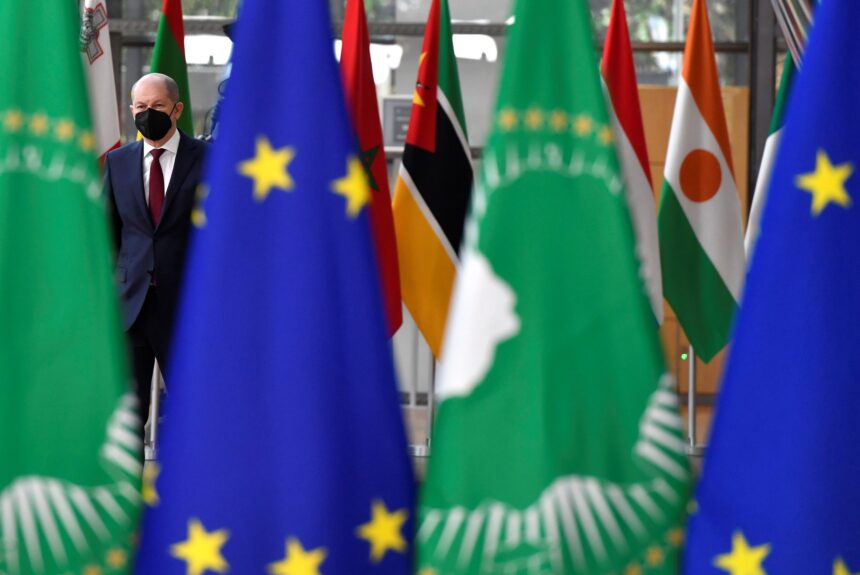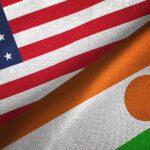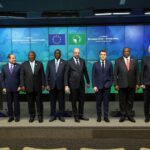Summary by Geopolist | Istanbul Center for Geopolitics:
In June 2024, the European Union (EU) held elections that resulted in a new composition of the European Parliament (EP). This new composition, with the conservative European People’s Party (EPP) as the largest group and a general shift to the right, suggests that the EU’s foreign policy approach will not see a significant acceleration in relations with Africa.
Key points from the document include:
Limited Focus on Africa
- Election Manifestos: An analysis of the main political groups’ manifestos reveals that African issues are scarcely mentioned. When they are, the focus is mainly on border management, migration, and asylum issues, with some references to trade in the EPP manifesto. This indicates a potential shift towards security issues, with a greater emphasis on border control, migration, and mobility.
- Debate Focus: The electoral debate largely overlooked Africa, with exceptions for energy and migration issues. European and national security priorities, such as Ukraine and eastward enlargement, overshadowed global partnerships.
Impact of Global Events
- Geopolitical Priorities: International crises like the pandemic, the war in Ukraine, and the Middle East situation have changed geopolitical priorities, testing the EU-Africa relations. These events highlighted fractures between Europe and the Global South and revealed perceived double standards in the EU’s international stance.
Strategic Importance of Africa
- Partnership Efforts: Despite challenges, Africa remains a key priority for Brussels. Initiatives such as the Global Gateway, which allocates half of its funds to African projects, underline the EU’s commitment. However, achieving meaningful engagement requires addressing mutual interests and conflicts, particularly in the areas of energy transition and migration.
Challenges and Opportunities
- Trade and Aid: The EU is Africa’s largest trading partner and aid donor, highlighting the importance of the relationship. However, European-African initiatives must be seen as mutually beneficial to be effective.
- Green Transition: Conflicting interests in the green transition necessitate a balance between climate and economic sustainability. European trade policies can also impact migration, necessitating a more integrated approach to legal pathways.
National Strategies
- Italy’s Mattei Plan: Italy’s Mattei Plan for Africa, launched by Prime Minister Giorgia Meloni, focuses on education, health, agriculture, water, and energy. It aims to address migration push factors through socio-economic improvements in African countries. Italy’s recent re-engagement with Africa, including official visits and the Italy-Africa Summit, underscores its commitment to strengthening ties.
Future Prospects
- EU Leadership: The success of the EU-Africa partnership depends on the new leadership in Brussels and Addis Ababa. Coordination among European countries, each with its own national strategy for Africa, is crucial.
- Rome’s Role: Italy’s initiatives, including its G7 presidency, highlight its desire to play a leading role in the Mediterranean and Africa. The Mattei Plan, if supported by broader European commitment, could significantly impact EU-Africa relations.
In summary, while the new EP composition and recent geopolitical events present challenges, Africa remains a strategic priority for the EU. Initiatives like Italy’s Mattei Plan and the Global Gateway offer potential pathways for deeper engagement, though achieving this will require addressing mutual interests and overcoming historical and geopolitical obstacles. Read the full article below.
In June 2024, the European Union (EU) went to the polls. With the new composition of the European Parliament (EP) and the appointments of the EU’s top jobs, a new course is setting for the EU’s foreign policy approach. How will “geopolitical Europe” develop? How will this impact its relations with Africa?
At the moment, the new composition of the EP emerging from the elections – which sees the reconfirmation of the conservative European People’s Party (EPP) as the largest group, but a general shift to the right – does not suggest any acceleration in relations with Africa. An analysis of the manifestos of the EP’s main political groups drafted by Benedikt Erforth and Niels Keijzer shows how African issues are overall scarcely present, and, when they are mentioned, they mainly focus on border management, migration and asylum issues (with references to trade, especially in the EPP manifesto). This suggests, albeit in general continuity with what has been done before, a possible shift towards security issues with a greater accent on border control, migration and mobility.
Africa featured little in the electoral debate, with the important and unsurprising exceptions of energy and migration and asylum issues. Aspects of national and European security, with diplomatic, security and economic priorities pointing to Ukraine and eastward enlargement, partly overshadowed global partnerships.
In the past years, under the pressure of international shocks and geopolitical rivalry, this fate already befell many African issues of Brussels’ foreign policy agenda, despite an acceleration on the EU-Africa portfolio at the beginning of Ursula Von der Leyen’s mandate. Since then, relations have been tested in many ways. Events such as the pandemic (which also led to the postponement of the much awaited 6th AU-EU Summit, later held in Brussels in February 2022), the war in Ukraine, and the current situation in the Middle East have not only changed geopolitical priorities, but they have also been a test against which European and African leaderships have been able to measure the solidity of their convergences, the extent of their distances, and the mutual credibility of their positions.
The different weight accorded to major international crises, from Ukraine to Gaza, have highlighted many elements of fracture between Europe and the Global South. More often than not, they have also shown, in the eyes of their African partners, double standards in the EU’s stance on international affairs. As new global partners strengthen their ties with Africa, observers in the continent are more and more vocal and sensitive about neo-colonial practices or lexicons to which public opinion is increasingly intolerant. For Brussels, the geopolitics of relations with Africa is not only a question of funding, but also of regaining the hearts and minds of African partners for whom a relationship with Europe is now only one of many possible options.
However, the partnership with Africa is still at the heart Brussels’ global priorities, from the Global Gateway (with half of its funds going to African initiatives), to the energy transition, as well as the EU’s credibility as a multilateral player. Two years after the Europe Africa summit in February 2022, there is a strong sense of what still needs to be done. At the same time, this path is notably arduous.
Europe-Africa: the search for meaningful engagement
Geert Laporte, in his contribution to this dossier, refers to this as the EU’s ‘Murphy’s law’, highlighting the numerous obstacles and setbacks that have made the relationship between Europe and Africa a bumpy road. However, this does not mean that it is not worth pursuing. At a closer glance, when one looks at figures, European countries remain among the region’s top trade, financial and humanitarian partners. Moreover, the EU is Africa’s largest trading partner at continental level (second to China if one looks to sub-Saharan Africa only) and the largest aid donor.
Relations with Africa have often been identified by the EU as a key priority. In the process of developing the partnership, Brussels leaders have repeatedly – and somewhat pompously – referred to Africa as a ‘sister continent’ destined to be a preferential partner, if only by virtue of its geographical proximity. This relationship, however, cannot be taken for granted. Initiatives such as the Global Gateway can show their full potential if they are based on meaningful political dialogue aimed at bringing concrete impacts, as Chloe Teevan writes in her contribution to this dossier. The perception that European-African initiatives are not actually mutually beneficial and at times detrimental to African countries, needs to be addressed. Romy Chevallier and Hannah Sack contribute on this aspect with a piece highlighting how European and African priorities on a just green transition can often lead to mutual interests conflicting, calling for a balance between short- and long-term goals and between climate and economic sustainability. Speaking of divergence of interests, Mark Langan addresses in his piece what he calls ‘the dilemma of the European Partnership Agreements’, the free trade deals between African and EU areas, highlighting the unintended role that European trade policies can play in stimulating migration. On the latter front, Brussels pursues a border control and flow containment approach based on a decade-long trend, argues Agnese Pacciardi, leaving much work to be done on strengthening legal pathways to Europe.
To tackle these issues, Geert Laporte argues that, when it comes to Africa, Europe must develop a unity of action on geopolitical issues similar to the one displayed with regard to the war in Ukraine. It is, of course, not an easy task. The EU spent a great deal of effort to support securitisation and development efforts in the Sahel, only to see agreements suspended following regime changes and geopolitical shifts in the region. This scenario, well summarised in Silvia D’Amato’s piece, raises questions on how to manage a potential fragmentation of the European approach in an area of high relevance. At the same time, as Guido Lanfranchi points out, the EU struggles to act as a major player in the horn of Africa. The collaboration between the EU and the African Union on strategic, security, development and other dossiers will of course depend on the new leadership in Brussels and Addis Ababa, after the AU’s 2025 office renewal, as Liesl Louw-Vaudran points out. However, collaboration can also be strengthened among European countries, many of which in recent years launched their own national strategies on Africa, adding to the action of actors that are already well-established in the continent, such as France (which, of course, currently faces growing hostility in the region). This new impetus testifies an acknowledged geopolitical relevance of the area by EU Member States (MS). Luca Saviolo’s contribution to this dossier outlines precisely the multiplicity of these national strategies that depicts what he calls a “a multi-speed Europe beyond its borders”.
Rome’s Mattei Plan
Among national strategies developed by EU members states, the Mattei Plan for Africa set up by Giorgia Meloni’s government has attracted particular attention in the past few months for its timing – right on the run up to European elections – and its appeal as a possible catalyser of cross-Mediterranean relations. The Italian prime minister has repeatedly stated her intention to put Africa in the spotlight of Rome’s foreign policy agenda. Setting the pace of the desire to relaunch Italy’s role as a player in the Mediterranean, the Mattei Plan has been mentioned and politically sponsored since the very first months of her presidency, but it was officially launched only in January 2024 at a rather packed Italy-Africa Summit held in Rome. As it has been outlined so far, the Plan revolves around five priorities: education and training, health, agriculture, water and energy, while the management of human mobility is not presented as a key objective per se, but rather as a transversal component, as the plan aims to tackle migration push factors through the promotion of socio-economic conditions in the countries of origin. To do so, it puts forward tools and mechanisms aimed at promoting and strengthening the engagement of the private sector in Africa with the support of state agencies, in order to move towards what still needs to be done in terms of developing the business potential between Italy and the continent, especially in sub-Saharan Africa.
Italy has returned to place (sub-Saharan) Africa fully within its foreign policy scope only in recent years, after a long period of disengagement. Over the past decade, Italian leaders have been travelling more to the area, and initiatives such as the 2013 Italy-Africa Initiative and the 2020 Partnership with Africa were developed. The current Africa strategy – still in phase of development and formulation – however, is enjoying greater momentum. Giorgia Meloni – who since the beginning of her presidency has made official visits to Ethiopia, Mozambique, the Republic of Congo, and several times to North Africa including Algeria, Tunisia, Libya and Egypt – has stated repeatedly her will to make the African dossier a foreign policy priority. Rome doubled down on this by emphasising the space dedicated to Africa in the agenda of the Italian G7 presidency. On 13-15th June, just a few days after the European elections, the meeting of the G7 heads of state was held in Puglia; a number of African leaders were invited within the outreach component, as well as the head of the African Development Bank Akinwumi Adesina, with whom new joint initiatives were agreed.
Given the broad scope of the proposed action, against an initial budget of 5,5 billion euros, Rome’s plan acquires greater impact when seen in light of the possibility of a broader European commitment, moving in line with other initiatives by Brussels (the Global Gateway, above all) and other member states. In an Europe that is looking for more pragmatic ways to relate with African partners who are increasingly less likely to hide their scepticism for European initiatives perceived as too vague, the often-expressed desire to abandon a paternalistic approach in favour of a franker and more rational relationship, repeatedly emphasised by Rome, certainly gathers very timely stimuli. The participation of the EU top representatives at the Rome summit suggests that the Plan could, indeed, move in this direction. As the EU is now setting the course of its new mandate, it is now time to see which kind of political and financial support will come from Brussels and the other European capitals to channel the initiative into choral actions.
By: Lucia Ragazzi
Source: ISPI







